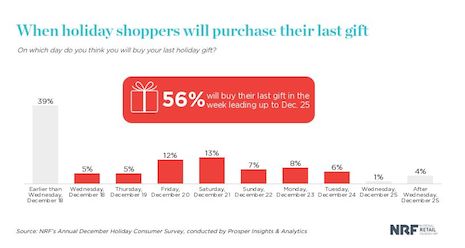- About
- Subscribe Now
- New York,
December 18, 2019

 Super Tuesday continues to be the biggest shopping day of the year. Image credit: NRF
Super Tuesday continues to be the biggest shopping day of the year. Image credit: NRF
Super Tuesday will continue to be the biggest shopping day of the year with an estimated 147.8 million U.S. consumers expected to participate, up from 134.3 million last year.
The number of people shopping on Super Saturday will cover both in-store and online activity.
The estimate compares with the 189.6 million unique shoppers over the full five-day Thanksgiving weekend, according to an annual survey by the National Retail Federation and Prosper Insights & Analytics.
“While many people started holiday shopping early, those who waited until Thanksgiving weekend are feeling the pressure due to the limited number of days this year between Thanksgiving and Christmas,” NRF president/CEO Matthew Shay said in a statement.
“But there is still time to catch up,” he said. “The last Saturday before Christmas has become the biggest shopping day of the year, and we expect an impressive turnout by procrastinators and those who just want to take advantage of really good deals.”
The number of people shopping on Super Saturday will cover both in-store and online activity
Retail detail
As of early December, 86 percent of holiday consumers had started shopping and they had completed 52 percent of their purchasing for the season, NRF said.
Last year at the same point, 88 percent of consumers had started and had completed 58 percent of their holiday purchases on average, the association said.
In 2013, the last time there were 26 days between Thanksgiving and Christmas, consumers had completed 50 percent of their purchases at the same point.
For those who had at least half of their shopping left, 41 percent were still deciding what to buy, 28 percent were waiting for family and friends to tell them what they wanted, and 26 percent were holding off for the best deals, per the study.
More than half (56 percent) of holiday shoppers plan to buy their last gift during the week before Christmas, and 62 percent are expected to shop on Super Saturday.
“Most of us are guilty of having that one last gift we need to buy,” said Phil Rist, Prosper’s executive vice president of strategy, in a statement. “Men and younger consumers continue to be the biggest procrastinators and are expected to turn out in force on Super Saturday.”
 When holiday shoppers will buy their last gift. Source: NRF and Prosper Insights & Analytics
When holiday shoppers will buy their last gift. Source: NRF and Prosper Insights & Analytics
Per NRF, top gift purchases so far included apparel (49 percent), toys (31 percent), gift cards (28 percent), books and other media (27 percent) and electronics (24 percent).
A quarter of shoppers (25 percent) plan to give “gifts of experience,” such as tickets to a concert or sporting event, the survey found. Gifts of experience are most popular among younger shoppers, given by 36 percent of those ages 18-34.
Shopping does not end with Christmas.
The survey found that 68 percent of holiday consumers will likely shop the week after Christmas (Dec. 26 through Jan. 1), NRF said. They plan to take advantage of post-holiday sales and promotions (49 percent) and use gift cards (27 percent). Younger consumers ages 18-24 are the most likely (84 percent) to shop the week after Christmas.
More than half of shoppers (55 percent) say they will return or exchange any unwanted gifts or holiday items within the first month after receiving them, the study found. The vast majority (80 percent) prefer to make returns and exchanges in stores, and 74 percent say they are likely to purchase something else while returning or exchanging an unwanted gift.
NRF DEFINES the holiday season as Nov. 1 through Dec. 31 and has forecast that sales will total between $727.9 and $730.7 billion.
Consumers expect to spend an average $1,047.83 – including purchases made earlier – for an increase of 4 percent over last year, according to an earlier NRF survey.
This current survey of 7,779 adult consumers was conducted Nov. 27 through Dec. 5 and has a margin of error of plus or minus 1.2 percentage points.
Share your thoughts. Click here